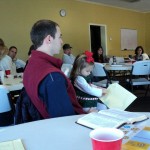Check out “Till He Comes”
A few weeks ago, when I was updating my blogroll, I added Jeremy’s blog “Till He Comes.”
I’ve greatly enjoyed reading Jeremy’s posts as well as his comments here on my blog (and comments on other blogs that I read).
If you haven’t checked out “Till He Comes” yet, here are some great articles to get you started:
- “Are Bedbugs the Modern Day Leprosy?“
- “The Heresy in Debates about James 2“
- “Money, Missions, and Megachurches“
- “Church Canceled Today“
Jump over to Jeremy’s blog and read a few articles. I think you’ll be glad that you did.
Who should teach?
In his latest post, Eric from “A Pilgrim’s Progress” presents another article in his series on house church: “House Church – Teaching.”
(By the way, it should be mentioned that Eric is presenting a particular form of meeting as a “house church.” All house churches do not follow what Eric is describing.)
In his post, Eric presents scriptural evidence that elders should teach, those gifted as teachers should teach, and others should teach as well.
I like the way that he concludes best of all. Eric points out that while teaching with words is important, teaching through actions is usually more effective:
Teaching, then, ought to be more than just verbal instruction. Â Teaching is most effective when it is experienced. Â Therefore, in the life of the church we best teach and are taught through both hearing and doing. To follow the model set forth by our Lord, we teach and learn through service to others.
In fact, I would say that teaching with words becomes effective only when it is combined with teaching through actions.
What do you think?
Stained Glass Masquerade
Have you heard the Casting Crowns song “Stained Glass Masquerade”? Here are some of the lyrics:
Is there anyone that fails
Is there anyone that falls
Am I the only one in church today feelin’ so smallCause when I take a look around
Everybody seems so strong
I know they’ll soon discover
That I don’t belongSo I tuck it all away, like everything’s okay
If I make them all believe it, maybe I’ll believe it too
So with a painted grin, I play the part again
So everyone will see me the way that I see themAre we happy plastic people
Under shiny plastic steeples
With walls around our weakness
And smiles to hide our pain
Arthur from “The Voice of One Crying Out in Suburbia” reminded me of this song with his post “Hiding behind our suits and smiles and status updates.” Arthur concludes his post with this:
The way we do church, gathering on schedule for an hour to “worship†leads to people hiding their hurting behind smiling faces and their Sunday best. We are rarely honest with each other because we spend so little time together. We need to get out of the pew and get into the lives and homes and families of other believers. We need to see what is going on behind the smiles because no one I have ever met really has it as together as they seem “in churchâ€. Brothers sharing over a cup of coffee, mothers sharing during a playdate, families spending time with other families. That is fellowship and community. Almost anyone can fake it for an hour and look happy. Those who can’t won’t come because they feel out of place. We need to shed the artificial world of church and get the church out of the building so we can see one another at our worst, not just at our best.
Have you and the people you meet with been able to shed the artificial “stained glass” world that Arthur is writing about? If so, there are hurting people who need to know how you did it. And, there are people out there who have never experienced this kind of openness that need to hear your example.
How did you and those in your fellowship move past artificiality into the messy realm of reality?
A useful how-to guide for avoiding conviction
My friend Dan at “The Ekklesia in Southern Maine” has written a blog series on how to avoid conviction. He writes about avoiding conviction caused by teaching, the examples of others, reading Scripture, and the Holy Spirit.
[Sarcasm warning: If you don’t like sarcasm or tongue-in-cheek humor, you should probably stay away from Dan’s posts above, and you should probably not read the remainder of my post. You have been warned.]
Dan tells us the purpose of this blog series:
This is a how-to guide on how to avoid those awful feelings of conviction that sometimes nag us on our Christian walk. I hope you find it helpful in relieving those annoying feelings of guilt and painful realizations that you may need to change.
There are certain situations that lead one to feel convicted. Each situation requires a different strategy in avoiding said conviction.
So, how do you avoid conviction?
James is not speaking of theological concepts
Last week, Arthur from “The Voice of One Crying Out in Suburbia” returned from a trip to Haiti where he was working with orphans. He talks about that trip – and some of the orphans that he met – in a post called “Beoda.”
Arthur’s post is primarily about an 11 year old boy named Beoda who lost his father in the earthquake last year. Apparently, spending time with Beoda and other orphans taught Arthur a very important lessons:
I asked Beoda and another young boy, Stevenson, to write their names in the small Bible I brought with me on the page facing the first chapter of James to remind me that James is not speaking of theological concepts to be debated in the ivy covered halls of academia. He was speaking of real people, real orphans who had their lives turned upside down. Real widows who lost their husband and often had children to care for in a very different, very difficult world. James was writing about Beoda and Selene, about Stevenson, about Kimberly.
Yes. YES! We MUST move beyond theological concepts.
What do you think about when you think of “love”? Do you think of people or concepts? What about service or discipleship or missions? What about orphans or widows? What about the least of these?
If we are still thinking only in terms of theological concepts and if we are not truly living these things among real people with real stories and real names, then we do not understand them at all.
Lessons learned globally
Speaking of global missions, Dave Black shares some of the lessons that he’s learned while traveling to Ethiopia two times per year since 2004 (Wednesday, January 26, 2011 at 4:40 a.m.).
Here are his “lessons learned”:
- Practical Christian fellowship calls for help when it is needed and not merely when it is asked for.
- Believers are, and always will be, saints together, regardless of race, nationality, political affiliation, or denomination. Yes, I said denomination.
- If I want to serve God I must never dash ahead of Him in impetuous enthusiasm nor lag behind Him in double-minded unbelief.
- Only when I apply the truth to my own life diligently can I prove my Christian discipleship to others, Ethiopians included.
- I must live sacrificially for others. Only then can I can rightly reflect the one who “though He was rich yet for our sakes became poor so that we through His poverty might become rich.”
- Missionary work is non-stop, 24/7. To call Sunday the “Lord’s Day” doesn’t mean that the other days belong to me.
- Spiritual warfare is never easy, and we are likely to get hurt. But the final victory is ours.
Have you learned any of these lessons?
Missions: Every Christian’s Job
Jeff at “Until All Have Heard” has done us a great service in his post “The awesome power of ‘informal missionaries.’”
What are “informal missionaries”? Informal missionaries are normal, everyday Christians who work a job like everyone else, but how share their faith in Jesus Christ with the people that they meet. In other words, they are not paid to be missionaries, or pastors, or evangelists, or whatever.
Jeff quotes several authors who write about the importance of “informal missionaries” in the life of the early church. Here are two that I particularly found helpful:
“The chief agents in the expansion of Christianity appear not to have been those who made it a profession or a major part of their occupation, but men and women who earned their livelihood in some purely secular manner and spoke of their faith to those whom they met in this natural fashion.” – Kenneth Scott Latourette, A History of the Expansion of Christianity
“The view that witnessing is ‘every Christian’s job’ was certainly the belief of the early Christians. Their acceptance of this task was perhaps the single most important factor in the astounding outreach and expansion of the early church. It was not simply that Peter, Paul, Stephen, and others spread the good news of salvation in Christ. It was rather that all Christians—small and great, rich and poor, slaves and freedmen—made it their consuming passion to tell others about the Lord.” – David J. MacLeod, The Witness of John the Baptist to the Word
Being a witness for Jesus Christ and making disciples is certainly the “job” of all Christians. I wonder what would happen to our communities if every follower of Jesus Christ saw this as part of their “job description”…
A modern widow’s mite?
Jesus praised a widow who put her last pennies into a collection that would be used to care for the poor.
He praised her. She had no way to care for herself, and he praised her.
He didn’t praise the people who put in hundreds and thousands of dollars. He praised the widow who gave pennies and could no longer care for herself.
Don’t believe me? It’s right here:
And he sat down opposite the treasury and watched the people putting money into the offering box. Many rich people put in large sums. And a poor widow came and put in two small copper coins, which make a penny. And he called his disciples to him and said to them, “Truly, I say to you, this poor widow has put in more than all those who are contributing to the offering box. For they all contributed out of their abundance, but she out of her poverty has put in everything she had, all she had to live on.” (Mark 12:41-44 ESV)
Notice that Jesus praised the widow because she gave “everything she had, all she had to live on.”
Now, Sol at “Looking for Church” has brought this passage into the present with his post “What did I Give.”
Sol writes:
I know a man who has almost no money, no retirement, no savings account, and no ability to work to gain money. I don’t want to get into how I was able to help this man, but it involved buying him something. As I was leaving his apartment, he wanted to pay back part of the money now, and the rest in two weeks.
As he insisted, I told him to give the money to someone who needs it, and he then told me that he does that. What!?! I thought. You already do?
This man, knowing that he has no money, knowing he is about to part with his savings, and would need to save more to pay the rest in two weeks, was already doing it!?!
He told me that just yesterday, already knowing he needed to pay this money, while he was out getting some food, saw a homeless man and bought him lunch.
Wait… I thought Jesus’ statements (like in the passage above) were hyperbole? You mean we are actually supposed to give to people even when it means we do without?
Week of Prayer for Christian Unity
Thanks to Jonathan at “Jon’s Journey” for telling us that this is the “Week of Prayer for Christianity Unity.”
I have to admit that unity among brothers and sisters in Christ has only been a concern of mine for the last few years. Before that, I was only concerned with unity among those who are members of a local church. The two concerns are not the same… not the same at all.
So, why don’t we join Jonathan in praying as Jesus prayed:
I do not ask for these only, but also for those who will believe in me through their word, that they may all be one, just as you, Father, are in me, and I in you, that they also may be in us, so that the world may believe that you have sent me. The glory that you have given me I have given to them, that they may be one even as we are one, I in them and you in me, that they may become perfectly one, so that the world may know that you sent me and loved them even as you loved me. Father, I desire that they also, whom you have given me, may be with me where I am, to see my glory that you have given me because you loved me before the foundation of the world. O righteous Father, even though the world does not know you, I know you, and these know that you have sent me. I made known to them your name, and I will continue to make it known, that the love with which you have loved me may be in them, and I in them. (John 17:20-26 ESV)
While we’re praying, why not ask God to bring a brother or sister into our lives from a different local church, a different denomination, a different theological tradition, so that we can demonstrate our unity in Jesus Christ in spite of our differences?
Top 10 Because of You!
Or, to put it in proper English, “Top 10 Because of Y’all!”
What am I talking about? My friend Dan at “The Ekklesia in Southern Maine” has named this blog one of his top 10. See his post “Top 10 of 2010: The Assembling of the Church.”
I am very appreciative that Dan would honor my blog like this. But, if you click on the link and read between the lines, you’ll see that my articles are not the only reason that Dan praises this blog.
Nope. In fact, several times Dan mentions the community here at “The Assembling of the Church.” That would be you guys and gals!
As I’ve said many, many times, the best thing about this blog is the fact that my readers interact with my articles and add their own “2 cents” to whatever I write.
I learn so much from all of you. (Yes, even you, Dan!)
So, thank you for being part of this blog and for being part of my life!










